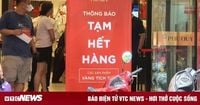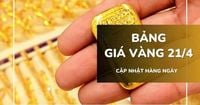In Vietnam, the gold market is facing a significant shortage, raising concerns among consumers and investors alike. On April 21, 2025, numerous gold shops in both Hanoi and Ho Chi Minh City reported being completely out of SJC gold bars and various types of gold rings, leaving only jewelry available for purchase. Customers flocked to these stores, but many left empty-handed as shops restricted sales to only a few items per person, typically allowing just one gold ring purchase daily.
This scarcity has prompted questions about whether the gold market is genuinely experiencing a shortage or if shops are deliberately hoarding gold to create an artificial demand. Economic expert Dr. Nguyen Tri Hieu weighed in on the situation, confirming that the shortage is indeed real. "The supply of gold is currently very limited, both for gold bars and rings. The State Bank has focused on selling SJC gold bars to just four state-owned commercial banks and the SJC Company, rather than distributing to a wider array of dealers. Therefore, gold shops may not have any gold available for sale," he stated.
Dr. Hieu further explained that the current market conditions are compounded by a general trend where consumers are primarily buying gold rather than selling it, leading to a tightening supply. Previously, businesses could source gold from various floating markets, but stricter regulations have led them to mainly procure gold from themselves or from brands with clear documentation and origins.
"This has made raw gold increasingly scarce," Dr. Hieu noted. He also pointed out that some gold retailers might be hoarding their gold, anticipating price increases. This tactic could further exacerbate the perceived scarcity, prompting consumers to buy more gold out of fear of missing out on rising prices.
Mr. Nguyen Quang Huy, CEO of the Faculty of Finance and Banking at Nguyen Trai University, echoed Dr. Hieu's sentiments, stating that the shortage at stores is understandable given the limited supply, particularly of gold bars, due to strict import and distribution controls. He explained that when gold prices surge, it can lead to a sudden spike in demand as investors react to the rapidly changing market conditions.
As gold prices have been climbing steadily, the psychological effect known as FOMO (Fear of Missing Out) has led to increased buying pressure, causing temporary imbalances in the market. On April 21, SJC gold bars saw a price increase of 5 million VND per tael, reaching 116 million VND for buying and 118 million VND for selling. Other retailers, such as Doji Group and PNJ, reported similar increases in their gold prices, highlighting a broader trend across the market.
To improve the gold supply situation, experts advise that consumers should refrain from rushing to buy gold, which could further inflate prices and exacerbate the shortage. Dr. Hieu suggests that the government should consider lifting the monopoly on gold imports to enhance supply, which could stabilize prices and reduce the gap between domestic and international gold prices.
Additionally, establishing an official gold exchange could facilitate better price linkage between domestic and international markets, promoting transparency in gold trading. Such an exchange would help regulate the market more effectively, reducing the prevalence of illegal gold transactions and enhancing overall market integrity.
Mr. Huy emphasized the need for a flexible, transparent, and synchronized strategy for managing gold in Vietnam. He warned that the significant price disparity between domestic and international gold prices leads consumers to view gold as a safe haven for asset storage, which in turn encourages hoarding and limits capital flow in the economy.
Despite the current market turmoil, Mr. Huy reassured that the phenomenon of gold hoarding has not yet become widespread due to the State Bank's control over gold bars and the stability of the Vietnamese dong. However, he cautioned that if the price gap continues to widen, it could lead to negative consequences for the financial market and the effectiveness of monetary policy.
With global uncertainties looming, many consumers are increasingly worried about the devaluation of the currency and systemic risks, prompting them to reduce their savings deposits and increase their physical gold holdings. Mr. Huy noted that this defensive behavior arises from a lack of professional risk prevention tools available to the public.
As of April 21, 2025, the domestic gold market is witnessing a robust recovery following a sharp decline at the end of the previous week. The spot price of gold has risen by 1.67% to 3,382 USD per ounce, while futures contracts for June have increased by 2.01% to 3,395 USD per ounce.
In summary, the gold market's current situation reflects a complex interplay of consumer behavior, regulatory controls, and market psychology. As prices rise and supply tightens, both consumers and experts are left to navigate an increasingly volatile landscape, with the hope that timely regulatory adjustments can restore balance to the market.





